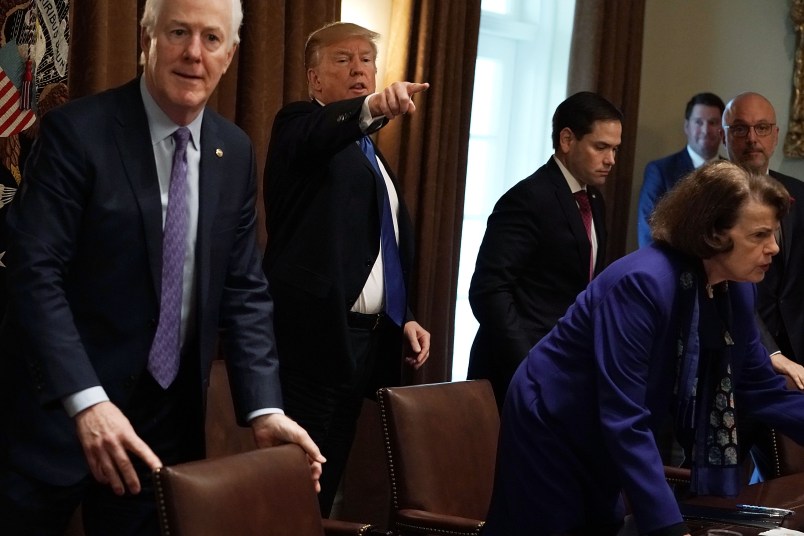With the deadline to pass an omnibus budget bill to fund the federal government just a few weeks away, Congress is considering a rescue package for Obamacare’s troubled individual market, including funding for stabilization measures aimed at bringing down rising insurance premiums.
Lawmakers pushing the effort—begun back in the summer and fall of 2017—are hoping to counteract the damage to the individual market caused by a string of Trump administration moves, from terminating cost-sharing reduction payments for insurance companies to defunding open enrollment outreach to encouraging the proliferation of cheap, skimpy, off-market health plans.
The revived congressional effort comes as the Trump administration’s policies are poised to take a serious toll on the individual market. A new study from the health consulting firm Avalere found that the Association Health Plans rule drafted by the Labor Department would draw millions of people out of the individual market. Because those likely to opt for the bare-bones plans are younger and healthier, the risk pool of people who remain in the individual market will be smaller, sicker, and more expensive. Avalere predicts premiums will go up as much as 4 percent, and an additional 140,000 Americans will be priced out of the market and become uninsured after 5 years.
The administration’s move to allow people to purchase short-term health plans that flout the ACA’s rules is predicted to have a similar impact. A study by the Urban Institute released last week estimates that 4.2 million people will enroll in the short-term plans, which are allowed to charge people much higher premiums or exclude them altogether based on their age, gender, and health status, driving premiums up in the individual market by nearly 20 percent.
House Republicans, hoping to avoid this health market chaos ahead of the 2018 midterm elections, are reportedly exploring a budget gimmick that would allow them to fund ACA stabilization policies without making a dent in the government’s official balance sheet.
Republicans on the House Budget Committee have informed The Hill that they may direct the Congressional Budget Office to change the baseline it uses to calculate how much various policies will impact the federal deficit. The CBO had been scoring bills assuming the billions in CSR payments the Trump administration terminated in October will continue to be paid, even though Congress has repeatedly put off restoring that funding. If the CBO changed their baseline to not include the payments, then it would score the restoration of payments as a cost-saver, because restoring the payments would theoretically bring down individual market premiums, thus costing the government less in subsidies.
Congress could then use that money saved to fund another program aimed at bringing down premiums and stabilizing the individual market: reinsurance.
Though some Republican lawmakers—including Sens. Lamar Alexander (R-TN) and Susan Collins (R-ME)—have for months been pushing for ACA stabilization bills, arguing they would save money for both individual families and the federal government, many in the party’s right-wing have been staunchly opposed, calling the policies “welfare” and a “bailout” for the insurance industry.
A Senate Democratic aide told TPM on background that while talks are moving forward on attaching both CSR payments and a reinsurance program onto the upcoming omnibus, the same resistance from Republicans and other hurdles remain.
One of them, the aide said, is the chance that the GOP will insist on including language drafted by Rep. Ryan Costello (R-PA) that would expand an existing ban on federal dollars going to abortion providers. Anti-abortion groups have demanded that no CSR payments go to any insurance plan that covers abortion—meaning all plans in New York and California would be denied the subsidies.
“There are concerns about House Republicans pushing the Costello amendment, which is obviously a nonstarter for us,” the aide told TPM. “The goal is still to get something in the omnibus that lowers health costs for families, and we’re still looking at CSRs and reinsurance as a general framework, but what exactly it looks like is still up in the air. Realistically, it won’t come together until the last minute.”
If Congress is unable to agree on a plan as part of the late March omnibus, insurers could announce they are hiking their 2019 rates or leaving the individual market altogether. But even if Congress manages to pass the stabilization policies after a multi-month stalemate on the issue, health care experts are unsure they would be adequate to counteract the administration’s damage to the individual market, and some say it may do more harm than good.
When the Trump administration cut off the CSR payments last year, insurers reacted by loading the cost increases mainly into federally-subsidized plans, protecting most people from rate hikes and counterintuitively making many plans cheaper than before. If the CSR payments were reinstated by Congress this year, after companies had already adjusted to the new normal, it could cause further turmoil. Economists are more optimistic about the reinsurance proposal, which would subsidize the coverage of the people in the individual market with the most serious health needs, but say that it too would not fully balance out the harm to the market caused by the repeal of Obamacare’s individual mandate.










